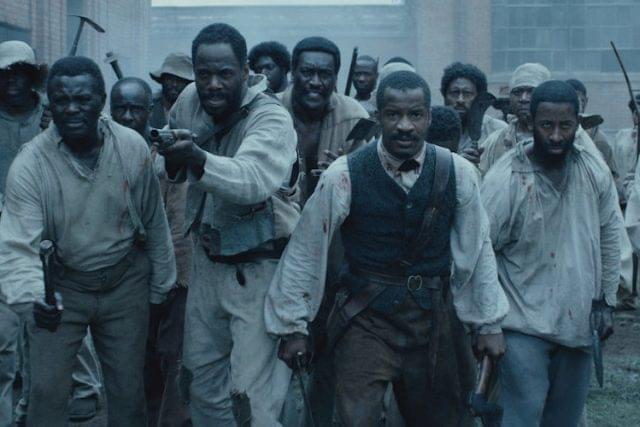
The greatest accomplishment of Nate Parker’s “The Birth of a Nation” might be reclaiming that title from the important and influential but irredeemably racist “Birth of a Nation” released 101 years earlier. That “Birth” said blacks and whites could never be integrated and that the KKK saved the South. The new “Birth” tells the true story of Nat Turner’s 1831 slave rebellion, bringing a long-remembered but little-discussed American hero into the limelight with shocking urgency.
Parker, an actor with minimal experience behind the camera, wrote and directed the film and stars as the grown-up version of Nat Turner. But when we first meet Nat, he’s a relatively carefree 9-year-old (played by Tony Espinosa) who plays hide-and-seek with his master’s boy, Samuel (Aiden Flowers), and is invited by the master’s wife (Penelope Ann Miller) to learn to read. Mrs. Turner, a God-fearing Christian sincere in her beliefs, feel that if the good Lord has blessed this slave boy with more aptitude than most members of his inferior race, she’s duty-bound to foster it.
This tangled interaction of racism and religion runs through the film and is the most unified theme in it. As an adult, still a slave but now the property of grown-up Samuel (Armie Hammer), Nat comes to be in demand thanks to his knowledge of the Bible. A local minister (Mark Boone Junior) approaches Samuel with the idea of renting Nat out to preach to congregations of slaves on the subject of submission — in other words, to use the Bible to keep his fellow slaves placated.
This is what leads to revolt. (Actually, it was probably teaching Nat to read in the first place. Never let the people you are oppressing become literate!) Nat preaches as instructed and becomes a spiritual leader, sought out for guidance even by whites. But the more he sees of slavery’s atrocities — breaking a hunger-striking slave’s teeth to force-feed him; letting lusty white men rape whichever slave women they fancy — the less he can ignore the parts of the Bible that would seem to forbid it in favor of the parts he’s been using in its defense. This culminates in an absolutely electric scene where Nat and the white preacher have an argument about slavery that consists entirely of Bible verses.
Parker conveys the horrors of slavery without dwelling overmuch on them. In general, and in contrast to “12 Years a Slave,” Parker doesn’t see a need to wallow in the specifics in order to convince us that slavery was awful. He assumes we agree that slavery was awful because owning another human being is inherently wrong, regardless of how they’re treated. Let’s not waste time (as so many slavery discussions do) nitpicking the details of which particular cruelties were inflicted on which wrongfully owned children of God.
Parker’s performance as Nat is stoic and charismatic — more than is accurate, probably, but why should Nat Turner get any less of a hagiography than other historical biopic subjects? I also like Penelope Ann Miller’s earnestly Christian slaveowner, a woman doing her sincere best with the limited enlightenment she has received. She’s been taught that blacks are inferior to whites, but unlike many of her fellow Christians, she doesn’t take that as license to treat them uncharitably. Armie Hammer likewise shows range as Samuel Turner, conveying the nuances of being a non-wealthy slaveowner in a rapidly changing world, a man at war against his own impulses and upbringing.
The last 30 minutes of the film, depicting the rebellion and its aftermath, are horrific and stirring, a righteous catharsis after 90 minutes of pent-up indignation. It makes up for the well-intentioned but clunky, sometimes meandering nature of the first half of the film, which has a TV-movie generic sheen to it. Some of the supporting performances are a bit off, too, a combination of on-the-nose writing and over-earnest acting.
The 1915 “Birth of a Nation” introduced audiences and filmmakers to new cinematic techniques that would become part of the craft, but it had a false, poisonous story that has overshadowed it ever since. The 2016 “Birth of a Nation” is the opposite: brimming with urgent, truthful messages, but unremarkable as a film. D.W. Griffith might have been a better craftsman, but Nate Parker is a better American. Like the rebellion itself, the film tries to accomplish more than it’s capable of, but it’s a necessary step in the right direction.
B (1 hr., 50 min.; )





